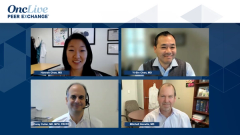
Emerging Agents in GVHD: Axatilimab
The panel reviews axatilimab, an emerging agent for chronic GVHD under clinical studies. The experts explore findings from the Agave-201 study, highlighting potential challenges of intravenous administration and axatilimab’s unique mechanisms.
Episodes in this series

This is a video synopsis of a discussion involving Dr Yi-Bin Chen, Director of the Transplant and Cell Therapy Program at Massachusetts General Hospital and Professor of Medicine at Harvard Medical School; Dr Corey Cutler, Director of the Stem Cell Transplant Program at Dana-Farber Cancer Institute and Professor of Medicine at Harvard Medical School; Dr Mitchell Horwitz, Professor of Medicine and Director of the Adult Blood and Marrow Transplant Program at Duke University, and Dr Hannah Choe, Assistant Professor and Director of the Graft-versus-Host-Disease (GVHD) program at Ohio State University.
The panelists discuss a novel agent, axatilimab, presented at ASH [American Society of Hematology] Annual Meeting 2023, believed to be close to approval for treating chronic GVHD. Axatilimab is a monoclonal antibody targeting CSF-1 receptor on activated macrophages, addressing both infection-fighting and inflammatory aspects.
Dr Chen highlights findings from the phase 2 Agave-201 study, conducted globally with 121 sites, evaluating three different doses of axatilimab. The primary endpoint, best overall response rate in the first 6 months, revealed promising results. The lowest dose cohort, 0.3 mg/kg every two weeks, showed the highest numerical response rate at 74%, while the highest dose cohort exhibited a 50% response rate. Subgroup analyses, though limited by the study's size, demonstrated impressive responses across different patient groups.
The panel emphasizes the potential challenges of axatilimab's intravenous administration, impacting community delivery and patient preferences. Concerns arise about a dose-dependent increase in liver enzymes, questioning whether it reflects actual toxicity or the drug's mechanism of action on macrophages.
Dr Horwitz expresses excitement about a potential new active agent for chronic GVHD but acknowledges logistical challenges associated with intravenous administration. Dr Cutler discusses the inverse relationship between toxicity and efficacy, speculating on the impact of higher doses on both pathological and normal monocyte macrophage lineage cells.
Dr Choe is pleased with the drug's tolerability, particularly in lower doses, emphasizing the decrease in concerning adverse events like peri-orbital edema. She notes the patient's willingness to tolerate inconvenience for the drug's benefits and expresses hope for its performance in earlier lines and potential combination therapies.
In conclusion, the panel sees axatilimab as a promising addition to chronic GVHD treatment, with unique mechanisms of action, but acknowledges the need for careful consideration of its intravenous delivery and potential toxicities.
Video synopsis is AI-generated and reviewed by OncLive® editorial staff.





































